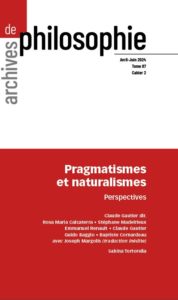 Tome 87, issue 2, April-June 2024
Tome 87, issue 2, April-June 2024
Pragmatisms and naturalisms: Perspectives
 Claude Gautier, Pragmatisms and naturalisms: Perspectives. Foreword
Claude Gautier, Pragmatisms and naturalisms: Perspectives. Foreword
Rosa M. Calcaterra, William James’s naturalism: From the pathos to the ethos of contingency
In this article, the author looks at James’s naturalism as an example of the intersections between biology, psychology, and philosophy. The article reconstructs James’s main epistemological, ethical, and metaphysical arguments to show how his philosophy fits in with Darwin’s biology. Thus, James’s contingentism becomes consistent with his criticism of the interpretation of the Darwinian principle of « natural selection » and with Darwin’s idea of ambiguity as a mark of physical and human reality.
Stéphane Madelrieux, Naturalism and human nature: The pragmatist theory of instincts
The question of instincts is a privileged entry point for understanding the relationship of pragmatism with naturalism. But the problem with William James and John Dewey’s theory of instincts is that, surprisingly, they maintain the idea of a « human nature. » This article claims that it is within the pragmatist theory of instincts that we find arguments to show that human nature does not univocally determine conduct. A well-understood analysis of the naturalness of the human being is sufficient to undermine any attempt to find in human nature the source of authority for the principles of conduct.
Emmanuel Renault, Dewey’s reconstruction of the concept of human nature
Dewey’s theory of human nature sheds light on the specificities of his naturalism and its political implications. The first part of this article analyzes how he substituted a processual, interactional, and integrative conception of human nature for the essentialist concept. The second part analyzes the classificatory function of the concept of human nature. The third part analyzes the way Dewey attributes an explanatory function to this concept by discussing conservative or progressive, even revolutionary, political references to human nature.
Claude Gautier, John Dewey’s valuation conducts: From the biological to the political
Taking the Theory of Valuation (1939) as its main jumping-off point, the aim of this article is to recall the main contours of Dewey’s theory of values, stressing the fact that it is fully within the scope of empiricist analysis—as opposed to the position of logical empiricism embodied here by Alfred Ayer—and that it makes it possible, in an original way, to reconstruct the continuum from the biological to the social. The aim is to show that a « politics of values » is thus possible because their naturalization, i.e., their anchoring in desires and interests, makes them debatable. The tension between nature and history then defines a space for the critique of values.
Guido Baggio, Naturalizing language: G.H. Mead’s evolutionary semiotics
Based on the theory of emotions developed by Mead and Dewey in the 1890s, this article illustrates the central aspects of Mead’s gestural theory, which forms the foundation of his theory of the emergence of meaning, language, and human cognition. The article also emphasizes how Mead’s theory is aligned with a socio-biological perspective on the naturalization of language, which is gaining popularity among evolutionary theories of language and neuroscientists alike.
Baptiste Cornardeau, Joseph Margolis and the fragility of the human world
Hybrid and emergent, artifactual and cultural without ceasing to be natural, the human world as Joseph Margolis understands it is also, in this very fact, in its various dimensions, a fragile, unstable world in perpetual reconstruction. Scientific and philosophical inquiry cannot free itself from a condition of impermanence where flux prevails over fixity, nor can it emancipate itself from a horizon of symbiotic discourse rooted in ordinary language. Characterized by their mongrel nature and their role in a conversational mid-world, human languages also respond, in their very indeterminacy, to the demands of shared and changing forms of life. Finally, human beings, enculturated and enlanguaged, remain inscribed in an intentional and historical world, which they incorporate and transform.
Jospeh Margolis, La fonction métisse du langage ordinaire. Traduction inédite
* * *
Sabina Tortorella, Political obligation according to Hegel
This article discusses the idea that Hegel, far from rejecting the question of political obligation, introduces this notion in a new light by relying on the notion of Gesinnung. Through a comparative reading of the introduction to ethical life and certain paragraphs devoted to constitutional law in the Elements of the Philosophy of Right, the article focuses on the concept of rectitude as well as that of patriotism, which represents the true political disposition. In the wake of Hegel’s institutionalist interpretation, the aim of the essay is to highlight the affinities between the Hegelian conception and the theory of associative political obligation.
